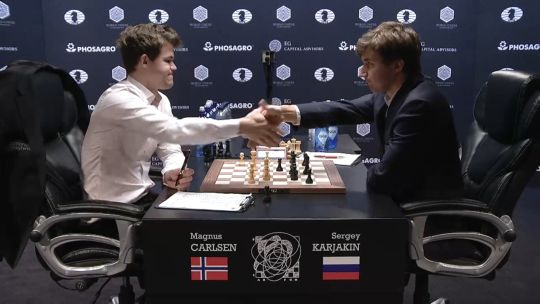A Radical Solution
Still reeling from the 35-minute punch of Game 12 of the “Classical” World Chess Championship match, I am writing this opinion article under the duress of disappointment. As a long-time critic of FIDE’s Rules Committee, I’m fully loath to enter its realm of spirited self-delusion but feel compelled to do so. Likely, in the morning, after a good night’s rest, I’ll disavow this commentary in whole or in part. Perhaps even hoping it may self-destruct. Before today’s shock wears off let us muse about the following…

After 30 moves and 35 minutes Magnus Carlsen and Sergey Karjakin
agreed to a draw in game 12 of their World Championship match.
I’ve long considered the “World Chess Championship” title as the crown jewel of the chess world. As the single most important title it should be handled with courtesy as well as great respect. Such has not always been the case; hence my numerous criticisms of the Rules Committee.
The chess of today has come a long way since I started shuffling the pieces in 1972. Nowadays we speak about the “World Chess Champion,” the “World Rapid Chess Champion and the “World Blitz Chess Champion.” We recognize three different and separate chess disciplines and award a world title to all three according to their time controls and formats. Very good. Of the three, the most prestigious is the one that is simply stated as, “World Chess Champion.” Concerning that title, we speak about Classical Chess. This distinction confuses even grandmasters as there are numerous Classical Chess time-controls. We grudgingly understand that a “Classical” game is meant to describe those that last “multiple hours”, as opposed to “Rapid Chess”, which is understood to be a game played in just under an hour, as well as “Blitz Chess”, a game to be played in just under ten minutes…
Back in 1972, the “(Classical) World Chess Championship” featured a 24-game match or, rather, the first player to score 12.5 points won the match. Later it would become, “the first player to score six wins” before reverting to 24 games. Then to 16 games and finally to the standard of today: A 12-game match.
Personally, I find a 12-game match to be far too short. Whereas a 24-game contest is now considered far too long. Perhaps a middle-ground of 18 games should be considered. I suspect that such a suggestion to lengthen the match by an additional six games would go precisely nowhere, so let me focus on the main point of this article.
As we have three separate and distinct World Champion titles I find that the situation of solving a tied Classical match (6-6) by playing Rapid Games and then potentially Blitz Games is extremely undesirable. Imagine Viswanathan Anand being interviewed by a journalist with no knowledge of chess: “Mr. Viswanathan in 2012 you won the Classical Chess World Championship against Mr. Gelfand. How did you do it?” Answer, “After the match was tied in the Classical Games, I beat him in the Rapid Chess tiebreakers.” A truthful answer to be sure, but confusing for a lay audience. Why is the Classical Chess Championship title decided by Rapid Games? And potentially Blitz Games as well? Very good questions. It strikes me that the rules governing Classical Chess matches are inappropriate.
Back in 1972 and earlier, the rule was that in case of a 12-12 tie in a 24-game match the winner was the reigning World Champion. A nice advantage to be sure. An even better rule favoring the reigning World Champion was the one that entitled him to a rematch in case he lost. These “champion’s privileges” of yesteryear were done away with, which is why we have the Rapid and Blitz tiebreak today.
Now, with the above background out of the way, here comes my call for a radical solution. It is motivated by the desire to see Classical Chess and only Classical Chess games featured in the World Championship match: Let the players have a 13-game match. The player with the extra game with the Black pieces has “draw-odds” in the match. The drawing of lots would not feature a blitz match, rather it would be the usual simple affair of drawing colors at the start of the contest.
If we are to entertain such a change to the rules, we must consider its possible effect. Firstly, if a final Game 13 has to be played, it will be decisive. No 35-minute long affair. The game would be played to the last full measure. At the start of the competition both players would fully understand their circumstances: someone would be obliged to play for a win as he would, in effect, “trail” in the match. A player with the White pieces trailing by a point at the start of Game 13 could not win the title, but would be playing for a split prize-fund.
My motivation for making this suggestion is twofold: Firstly, to keep the titles and the formats separate from one another. A player wins the World Championship match by playing chess games at Classical time controls only. Secondly, to avoid disappointment similar to what we had in today’s game. When the attention of the whole world has been captured, it is of paramount importance to deliver a spectacle. Not today’s dud.
It is highly likely that such a solution has already been offered by others. Possibly multiple times. If that is the case, my apologies for not giving them the credit they deserve. Thoughtful feedback appreciated.
























